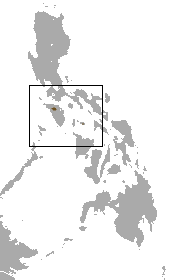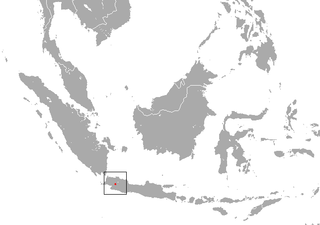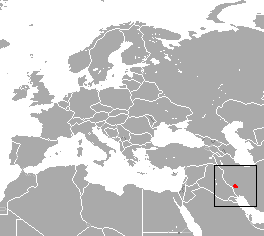
A species that is extinct in the wild (EW) is one that has been categorized by the International Union for Conservation of Nature as known only by living members kept in captivity or as a naturalized population outside its historic range due to massive habitat loss.

The Somali hedgehog is a species of mammal in the family Erinaceidae. It is endemic to Somalia and Somaliland. The Somali hedgehog is nocturnal.

The Mindoro shrew is a species of mammal in the family Soricidae. It is endemic to the Philippines.

The Oriental shrew is a species of mammal in the family Soricidae. It is endemic to Indonesia.

The pale gray shrew is a species of mammal in the family Soricidae. It is endemic to Pakistan and is distributed in the Shigar valley and the western edge of Deosai.

The Iranian shrew is a species of mammal in the family Soricidae. It is endemic to Iran. It is threatened by habitat loss.

Portenko's shrew is a species of mammal in the family Soricidae that is endemic to Russia.

The Caucasian shrew is a species of mammal in the family Soricidae. It is found in Armenia, Russia and Turkey.
Mesoperipatus is a monospecific genus of velvet worm in the Peripatidae family, containing a single species Mesoperipatus tholloni. It is found in Gabon, making it the only known species of velvet worm in the tropics of Africa, and the only known species of peripatid velvet worm in Africa. Females of this species have 24 to 27 pairs of legs; males have 23 or 24.
Speleoperipatus is a monospecific genus of velvet worm in the Peripatidae family, containing the single species Speleoperipatus spelaeus. This species is a pale greenish yellow, almost white, with 22 or 23 pairs of legs and no eyes.
Elaphoidella is a genus of freshwater copepods in the family Canthocamptidae. It contains over 200 species, including three classified as vulnerable species by the IUCN – three endemic to Slovenia and one endemic to the United States. In total, the genus Elaphoidella contains the following species:

Stygobromus is a genus of amphipod crustaceans that live in subterranean habitats. As well as a large number of species in North America, a smaller number of species are also known from Eurasia. Most of the North American species live in areas which were not covered by the Laurentide Ice Sheet, although a few species seem to have survived under the ice. A number of species are on the IUCN Red List as endangered species (EN) or vulnerable species (VU); all the listed species are endemic to the United States. One species, S. lucifugus, is extinct. Stygobromus includes the following species:
Stygodiaptomus is a genus of copepods in the family Diaptomidae, containing the following species:
Stygodiaptomus petkovskii is a species of crustacean in the family Diaptomidae. It is found in Bosnia and Herzegovina and Croatia.
Tropodiaptomus is a genus of copepods in the family Diaptomidae. It includes the following species, many of which are narrow endemics and are included on the IUCN Red List :

Cotesia is a genus of braconid wasps first described by Peter Cameron in 1891. Some species parasitize caterpillars of species considered pests, and are used as biocontrol agents. Cotesia congregata parasitizes the tomato and the tobacco hornworms. C. glomerata and C. rubecula feed on the cabbage white and other white butterfly caterpillars. C. gonopterygis and C. risilis are host-specific and parasitize the common brimstone.










